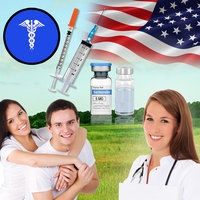Introduction
Testosterone Deficiency Syndrome (TDS), also known as hypogonadism, is a clinical condition characterized by low levels of testosterone that can affect various aspects of a man's health, including sleep quality. Recent research has begun to explore the intricate relationship between testosterone levels and sleep disorders, particularly in American males. This article delves into a polysomnographic study that examines how TDS influences sleep patterns and contributes to sleep disorders.
Understanding Testosterone Deficiency Syndrome
Testosterone Deficiency Syndrome occurs when the body does not produce enough testosterone, a hormone essential for male development and sexual function. Symptoms of TDS can include reduced libido, fatigue, depression, and decreased muscle mass. While TDS is often associated with aging, it can affect men of any age due to various underlying health conditions or lifestyle factors.
The Role of Sleep in Health
Sleep is a fundamental aspect of health, playing a crucial role in physical and mental well-being. Adequate sleep is essential for hormone regulation, cognitive function, and overall vitality. Disruptions in sleep patterns can lead to a range of health issues, including cardiovascular disease, obesity, and mental health disorders.
Exploring the Connection Between TDS and Sleep Disorders
Recent studies have suggested a bidirectional relationship between testosterone levels and sleep quality. Low testosterone levels can lead to sleep disturbances, while poor sleep can further decrease testosterone production, creating a vicious cycle. This polysomnographic study focused on American males aimed to quantify these effects and provide a clearer understanding of how TDS impacts sleep architecture.
Methodology of the Polysomnographic Study
The study involved a cohort of American males diagnosed with TDS, who underwent overnight polysomnography to monitor their sleep patterns. Polysomnography is a comprehensive test that records brain waves, oxygen levels in the blood, heart rate, breathing, and eye and leg movements during sleep. This detailed analysis allowed researchers to assess various sleep stages and identify specific sleep disorders associated with TDS.
Key Findings from the Study
The polysomnographic study revealed several significant findings. Men with TDS exhibited a higher prevalence of sleep disorders, including obstructive sleep apnea (OSA) and insomnia. The data showed that these men spent less time in restorative sleep stages, such as slow-wave sleep and rapid eye movement (REM) sleep, which are crucial for physical and mental recovery.
Moreover, the study found that testosterone replacement therapy (TRT) could improve sleep quality in men with TDS. Participants who received TRT showed improvements in sleep efficiency and a reduction in sleep fragmentation, suggesting that addressing testosterone deficiency could be a viable strategy for managing sleep disorders.
Implications for Clinical Practice
These findings have important implications for the clinical management of TDS and sleep disorders in American males. Healthcare providers should consider screening for TDS in men presenting with sleep disturbances, as addressing the underlying hormonal imbalance may improve sleep quality and overall health.
Conclusion
The polysomnographic study highlights the significant impact of Testosterone Deficiency Syndrome on sleep patterns in American males. By understanding the link between TDS and sleep disorders, healthcare professionals can develop more effective treatment strategies that address both hormonal and sleep health. As research continues to unravel the complexities of this relationship, it is clear that managing testosterone levels is crucial for promoting healthy sleep and enhancing the quality of life for men affected by TDS.
Contact Us For A Fast And Professional Response

- Understanding Testosterone Deficiency: Symptoms, Diagnosis, and Treatment for American Men [Last Updated On: March 1st, 2025] [Originally Added On: March 1st, 2025]
- Testosterone Deficiency Impact on Muscle Mass in American Men: Diagnosis and Treatment [Last Updated On: March 17th, 2025] [Originally Added On: March 17th, 2025]
- Environmental Toxins Linked to Testosterone Deficiency in American Males [Last Updated On: March 17th, 2025] [Originally Added On: March 17th, 2025]
- Alcohol's Impact on Testosterone and TDS in American Males: A Comprehensive Analysis [Last Updated On: March 18th, 2025] [Originally Added On: March 18th, 2025]
- Testosterone Deficiency Syndrome: Symptoms, Diagnosis, and Management Strategies for American Men [Last Updated On: March 18th, 2025] [Originally Added On: March 18th, 2025]
- Testosterone Deficiency Syndrome: Impact on Energy and Treatment Options for American Men [Last Updated On: March 18th, 2025] [Originally Added On: March 18th, 2025]
- Stress-Induced Testosterone Deficiency in American Males: Causes, Effects, and Management [Last Updated On: March 19th, 2025] [Originally Added On: March 19th, 2025]
- Smoking's Impact on Testosterone Deficiency in American Males: Mechanisms and Mitigation [Last Updated On: March 20th, 2025] [Originally Added On: March 20th, 2025]
- Testosterone Deficiency Syndrome: Understanding and Managing with Hormone Therapy [Last Updated On: March 20th, 2025] [Originally Added On: March 20th, 2025]
- Testosterone Deficiency in Men: Symptoms, Prostate Health, and Treatment Options [Last Updated On: March 20th, 2025] [Originally Added On: March 20th, 2025]
- Testosterone Deficiency in American Men: Impacts on Mood and Treatment Options [Last Updated On: March 20th, 2025] [Originally Added On: March 20th, 2025]
- Weight Training Benefits for Men with Testosterone Deficiency Syndrome [Last Updated On: March 21st, 2025] [Originally Added On: March 21st, 2025]
- Chronic Illness Impact on Testosterone Levels in American Males: Management Strategies [Last Updated On: March 22nd, 2025] [Originally Added On: March 22nd, 2025]
- Testosterone Check-ups Crucial for American Males to Combat Deficiency Syndrome [Last Updated On: March 22nd, 2025] [Originally Added On: March 22nd, 2025]
- Testosterone Deficiency and Sleep Apnea: A Bidirectional Health Challenge for American Males [Last Updated On: March 22nd, 2025] [Originally Added On: March 22nd, 2025]
- Vitamin D's Role in Managing Testosterone Deficiency in American Males [Last Updated On: March 23rd, 2025] [Originally Added On: March 23rd, 2025]
- Testosterone Deficiency and Joint Health: Insights for American Males [Last Updated On: March 23rd, 2025] [Originally Added On: March 23rd, 2025]
- Magnesium's Role in Managing Testosterone Deficiency Syndrome in American Males [Last Updated On: March 23rd, 2025] [Originally Added On: March 23rd, 2025]
- Testosterone Deficiency Syndrome and Immune Function in American Men: A Comprehensive Overview [Last Updated On: March 23rd, 2025] [Originally Added On: March 23rd, 2025]
- Testosterone Deficiency Impacts Body Composition in American Males: Muscle, Fat, Bone [Last Updated On: March 24th, 2025] [Originally Added On: March 24th, 2025]
- Testosterone Deficiency Syndrome: Impacts on Skin Health and Management Strategies for American Men [Last Updated On: March 24th, 2025] [Originally Added On: March 24th, 2025]
- Soy Consumption and Testosterone Levels in American Males with TDS: A Complex Relationship [Last Updated On: March 24th, 2025] [Originally Added On: March 24th, 2025]
- Testosterone Deficiency Syndrome: Impacts and Management in American Male Athletes [Last Updated On: March 24th, 2025] [Originally Added On: March 24th, 2025]
- Shift Work's Impact on Testosterone Levels and Deficiency Syndrome in American Males [Last Updated On: March 24th, 2025] [Originally Added On: March 24th, 2025]
- Zinc's Vital Role in Combating Testosterone Deficiency in American Men [Last Updated On: March 24th, 2025] [Originally Added On: March 24th, 2025]
- Testosterone Deficiency Linked to Dental Health Issues in American Males [Last Updated On: March 24th, 2025] [Originally Added On: March 24th, 2025]
- Testosterone Deficiency in American Men: Impacts on Vision and Eye Health [Last Updated On: March 24th, 2025] [Originally Added On: March 24th, 2025]
- Testosterone Deficiency Syndrome: Impact on Cognitive Function in American Men [Last Updated On: March 25th, 2025] [Originally Added On: March 25th, 2025]
- Plasticizers' Impact on Testosterone Levels and TDS in American Men: A Review [Last Updated On: March 25th, 2025] [Originally Added On: March 25th, 2025]
- Testosterone Deficiency and Depression: A Critical Link in American Men's Health [Last Updated On: March 25th, 2025] [Originally Added On: March 25th, 2025]
- Omega-3 Fatty Acids: A Natural Approach to Managing Testosterone Deficiency in Men [Last Updated On: March 25th, 2025] [Originally Added On: March 25th, 2025]
- Testosterone Deficiency and Hair Loss: Understanding and Managing in American Men [Last Updated On: March 25th, 2025] [Originally Added On: March 25th, 2025]
- Pesticide Exposure Linked to Low Testosterone in American Men: Health Risks and Mitigation [Last Updated On: March 25th, 2025] [Originally Added On: March 25th, 2025]
- Air Pollution's Impact on Testosterone Levels in American Males: A Growing Concern [Last Updated On: March 26th, 2025] [Originally Added On: March 26th, 2025]
- Testosterone Deficiency Syndrome and Its Link to Hearing Loss in American Males [Last Updated On: March 26th, 2025] [Originally Added On: March 26th, 2025]
- Testosterone Deficiency and Anemia: Impacts and Management for American Males [Last Updated On: March 26th, 2025] [Originally Added On: March 26th, 2025]
- Testosterone Deficiency in American Males: Impacts on Memory and Cognitive Health [Last Updated On: March 26th, 2025] [Originally Added On: March 26th, 2025]
- Fenugreek: A Natural Solution for Testosterone Deficiency Syndrome in American Males [Last Updated On: March 26th, 2025] [Originally Added On: March 26th, 2025]
- Blue Light Exposure Linked to Testosterone Deficiency in American Men: Mitigation Strategies [Last Updated On: March 26th, 2025] [Originally Added On: March 26th, 2025]
- Chronic Stress and Testosterone Deficiency Syndrome in American Males: Impacts and Management [Last Updated On: March 26th, 2025] [Originally Added On: March 26th, 2025]
- Diet Soda Consumption Linked to Lower Testosterone Levels in American Men [Last Updated On: March 26th, 2025] [Originally Added On: March 26th, 2025]
- Testosterone Deficiency and Thyroid Dysfunction: Interconnected Health Issues in American Males [Last Updated On: March 26th, 2025] [Originally Added On: March 26th, 2025]
- Boron Supplementation: A Natural Approach to Managing Testosterone Deficiency in American Males [Last Updated On: March 27th, 2025] [Originally Added On: March 27th, 2025]
- Ashwagandha's Potential in Boosting Testosterone for American Males with TDS [Last Updated On: March 27th, 2025] [Originally Added On: March 27th, 2025]
- Testosterone Deficiency in American Men: Impacts, Diagnosis, and Treatment Options [Last Updated On: March 27th, 2025] [Originally Added On: March 27th, 2025]
- High-Fat Diets and Testosterone Levels: Impacts and Dietary Recommendations for American Males [Last Updated On: March 27th, 2025] [Originally Added On: March 27th, 2025]
- Testosterone Deficiency and Liver Health in U.S. Males: Impacts and Management Strategies [Last Updated On: March 28th, 2025] [Originally Added On: March 28th, 2025]
- TDS and Gallbladder Disease: Insights, Risks, and Management Strategies for American Males [Last Updated On: March 28th, 2025] [Originally Added On: March 28th, 2025]
- Testosterone Deficiency Syndrome: Impacts on Kidney Function and Management Strategies [Last Updated On: March 29th, 2025] [Originally Added On: March 29th, 2025]
- Testosterone Deficiency Syndrome: Impacts on Pancreatic Health and Cancer Risk in Men [Last Updated On: March 30th, 2025] [Originally Added On: March 30th, 2025]
- Heavy Metal Exposure and Its Impact on Testosterone Levels in American Men [Last Updated On: March 30th, 2025] [Originally Added On: March 30th, 2025]
- EMF Exposure and Testosterone Levels: Implications for TDS in American Males [Last Updated On: March 31st, 2025] [Originally Added On: March 31st, 2025]
- Tribulus Terrestris: A Promising Herbal Aid for Testosterone Deficiency in American Males [Last Updated On: April 1st, 2025] [Originally Added On: April 1st, 2025]
- Testosterone Deficiency Syndrome: Adrenal Health's Role and Management Strategies [Last Updated On: April 2nd, 2025] [Originally Added On: April 2nd, 2025]
- Testosterone Deficiency Syndrome: Impact, Diagnosis, and Management in American Men [Last Updated On: April 3rd, 2025] [Originally Added On: April 3rd, 2025]
- Noise Pollution Linked to Testosterone Deficiency in American Males: A Growing Concern [Last Updated On: April 5th, 2025] [Originally Added On: April 5th, 2025]
- Fluoride Exposure and Its Impact on Testosterone Levels in American Men [Last Updated On: April 6th, 2025] [Originally Added On: April 6th, 2025]
- Testosterone Deficiency Syndrome: Impacts on Hypothalamic Function and Management Strategies [Last Updated On: April 8th, 2025] [Originally Added On: April 8th, 2025]
- Testosterone Deficiency Syndrome: Impacts, Diagnosis, and Treatment in American Males [Last Updated On: April 10th, 2025] [Originally Added On: April 10th, 2025]
- DHEA Supplementation: A Promising Treatment for Testosterone Deficiency Syndrome in American Males [Last Updated On: April 10th, 2025] [Originally Added On: April 10th, 2025]
- BPA Exposure Linked to Lower Testosterone and TDS in American Men: A Review [Last Updated On: April 10th, 2025] [Originally Added On: April 10th, 2025]
- Ginseng's Potential in Managing Testosterone Deficiency Syndrome: A Comprehensive Overview [Last Updated On: April 10th, 2025] [Originally Added On: April 10th, 2025]
- Testosterone Deficiency and Pineal Gland: Insights for American Males with TDS [Last Updated On: April 10th, 2025] [Originally Added On: April 10th, 2025]
- Testosterone Deficiency Syndrome: Impacts on Urinary Health and Management Strategies [Last Updated On: April 10th, 2025] [Originally Added On: April 10th, 2025]
- Phthalates' Impact on Testosterone and TDS in American Males: An Emerging Concern [Last Updated On: April 11th, 2025] [Originally Added On: April 11th, 2025]
- Testosterone Deficiency Syndrome: Impacts on Gastrointestinal Health in American Males [Last Updated On: April 13th, 2025] [Originally Added On: April 13th, 2025]
- Testosterone Deficiency in American Males: Impacts on Respiratory Health and Management Strategies [Last Updated On: April 13th, 2025] [Originally Added On: April 13th, 2025]
- PFCs Linked to Testosterone Deficiency in American Males: Environmental Health Concerns [Last Updated On: April 14th, 2025] [Originally Added On: April 14th, 2025]
- Phytoestrogens' Impact on Testosterone Levels in American Men with Hypogonadism [Last Updated On: April 17th, 2025] [Originally Added On: April 17th, 2025]
- Testosterone Deficiency Syndrome: Impacts and Management in American Males [Last Updated On: April 17th, 2025] [Originally Added On: April 17th, 2025]
- Cordyceps: A Natural Approach to Managing Testosterone Deficiency Syndrome in Men [Last Updated On: April 17th, 2025] [Originally Added On: April 17th, 2025]
- Testosterone Deficiency Syndrome: Impacts on Metabolic Health and Management Strategies [Last Updated On: April 18th, 2025] [Originally Added On: April 18th, 2025]
- Triclosan Exposure Linked to Testosterone Decline in American Men: TDS Risks [Last Updated On: April 18th, 2025] [Originally Added On: April 18th, 2025]
- Parabens' Role in Testosterone Deficiency Syndrome Among American Males Explored [Last Updated On: April 19th, 2025] [Originally Added On: April 19th, 2025]
- Shilajit: A Natural Remedy for Testosterone Deficiency in American Males [Last Updated On: April 19th, 2025] [Originally Added On: April 19th, 2025]
- Testosterone Deficiency Syndrome: Impact of Endocrine Disruptors on American Males [Last Updated On: April 19th, 2025] [Originally Added On: April 19th, 2025]
- Testosterone Deficiency and Autoimmune Disorders: A Critical Link for American Males [Last Updated On: April 19th, 2025] [Originally Added On: April 19th, 2025]
- Testosterone Deficiency: Impacts on Neurological Health in American Males [Last Updated On: April 19th, 2025] [Originally Added On: April 19th, 2025]
- Testosterone Deficiency: Impacts on Skin, Hair, and Psychological Health in American Men [Last Updated On: April 21st, 2025] [Originally Added On: April 21st, 2025]
- Organophosphate Pesticides Linked to Testosterone Deficiency in American Males [Last Updated On: April 21st, 2025] [Originally Added On: April 21st, 2025]
















